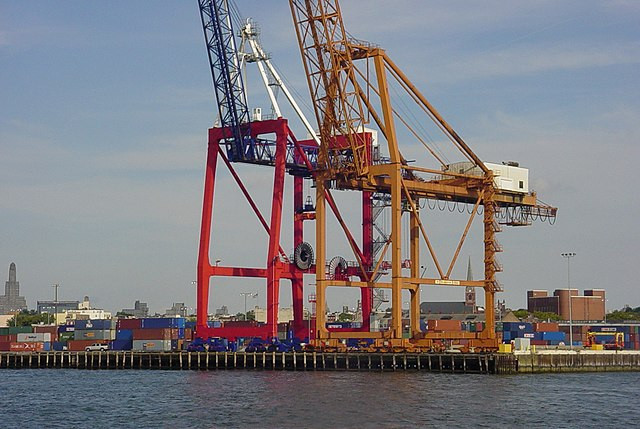The longest dockworker strike in nearly 50 years has entered its third day, triggering a rapidly growing backlog of ships and raising concerns about potential shortages of goods ranging from bananas to auto parts. The International Longshoremen's Association (ILA) launched a historic strike on Tuesday after labor talks broke down with the United States Maritime Alliance (USMX), leaving 45,000 dockworkers at ports from Maine to Texas off the job.
With no immediate negotiations scheduled, the situation at key East Coast and Gulf Coast ports has deteriorated. As of Wednesday, 45 container vessels were anchored outside these ports, unable to unload, compared to just three before the strike began, according to Everstream Analytics. "Many seem to have decided to wait it out, possibly in hopes of a prompt resolution to the strike," said Jena Santoro, an analyst at Everstream Analytics, who also warned that the backlog could double by the end of the week.
The strike affects 36 ports, including major hubs such as New York, Baltimore, and Houston. With these key ports closed, the disruption is already being felt, and concerns are mounting that the situation could have a prolonged impact on the U.S. economy. While some businesses accelerated shipments in anticipation of labor disruptions, a prolonged strike could lead to severe shortages, particularly of perishable items like food, as well as critical supplies such as auto parts and electronics.
The strike, the first of its kind since 1977, stems from the ILA's demands for higher wages and commitments to halt port automation projects, which the union argues could lead to widespread job losses. The USMX had proposed a 50% pay increase, but the ILA rejected the offer, citing that it fell short of addressing their concerns. In a statement on Wednesday, the USMX signaled openness to further negotiations, but expressed reluctance to accept preconditions for returning to the bargaining table. "Reaching an agreement will require negotiating," the statement said.
The Biden administration has placed pressure on port owners to raise their offer in an effort to reach a deal, emphasizing the need for a resolution before the economic impact worsens. "We cannot agree to preconditions to return to bargaining, but we remain committed to bargaining in good faith," the USMX added. Despite the administration's involvement, it has stopped short of using federal powers to halt the strike.
Economists have warned that while the initial impact on consumer prices may be limited, a longer strike could lead to price hikes, particularly in the food sector. Morgan Stanley economists noted that food prices could be among the first to rise if the strike continues, with other sectors such as electronics and cars following. Perishable goods like seafood and bananas, which pass through these ports, could become scarce on store shelves in the coming weeks.
Seafood, electronics, and auto parts are among the categories that could face significant shortages if the strike is not resolved swiftly. Chris Tang, a professor specializing in supply chain management at UCLA, highlighted the risks to perishable goods that cannot easily be rerouted, particularly seafood from countries like Iceland and Thailand. "Seafood products that require refrigeration are much harder to transport over long distances or to alternative ports," he said.
The National Retail Federation, along with more than 270 other trade associations, has urged the Biden administration to use its federal authority to end the strike, citing potential "devastating consequences" for the economy. A prolonged strike could have a ripple effect on holiday shopping, with some experts predicting shortages of toys and other goods just as consumers begin their holiday preparations.
"Any strike that lasts more than one week could cause goods shortages for the holidays," warned Eric Clark, portfolio manager at Accuvest Global Advisors. The impact could be severe for small and medium-sized businesses that rely on timely shipments and lack the resources of larger corporations to stockpile goods in advance. "For some businesses, missing critical holiday supplies could be the difference between turning a profit or ending the year at a loss," said Ben Johnston, chief operating officer at Kapitus, a small business lender.
As the strike continues, retailers, exporters, and manufacturers are grappling with the potential fallout. Agricultural producers, particularly those who rely on exports, are already feeling the pinch. Perishable goods such as soybeans and poultry are at risk of being lost as they remain stranded in warehouses and docks with no way to ship overseas.




